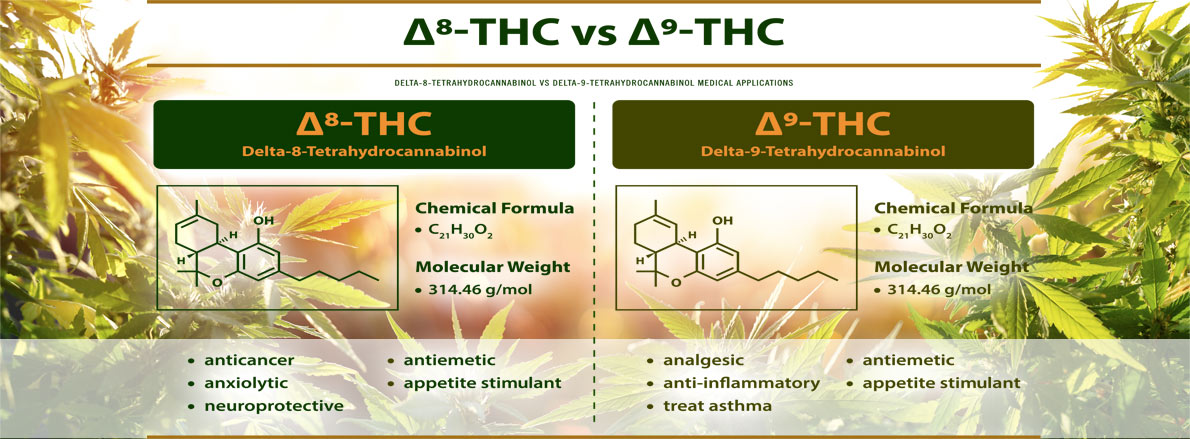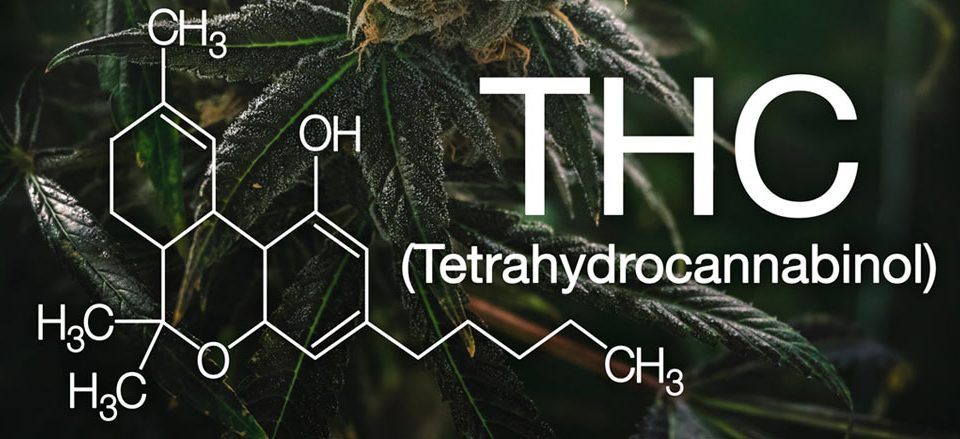Delta 8 THC vs. Delta 9 THC

What Is Delta 9 THC?
July 5, 2022As hemp derived cannabinoids continue to gain popularity, consumers are starting to look at the differences in THC in order to make better decisions on what works well for them. People who consume THC for its medicinal and psychoactive properties have been watching the Delta 8 vs. Delta 9 matchup for a long time now. These are two of the most famous cannabinoids derived from hemp and such, the topic of this article.
Delta 8 THC and Delta 9 THC are legal in most states and federally legal according to the DEA and Farm Bill. The FDA is still on the fence on how to handle cannabinoids, but they do acknowledge potential medicinal value.
Two Cannabinoids in a Spectrum
∆8-THC and ∆9-THC are just two cannabinoids in a lineup of over 100 known cannabinoids found in hemp plants. They're both mood enhancing molecules that are capable of producing strong psychoactive effects, which is why a reason THC has been criminalized for many years.
However, the tides have turned when it comes to THC with more and more states are adopting cannabis laws allowing consumers to safely medicate or use recreationally in the comfort of their homes.
∆8-THC and ∆9-THC, along with about 100 other cannabinoids, have been scientifically studied to provide relief from anxiety, chronic pain, muscle spasms and other health issues. THC is the most powerful cannabinoid found in hemp and is believed to be a neuro-protectant and in some cases, increase in focus and cognitive thinking.
Let's begin by describing the nature of THC and the differences between types of THC.
What Is THC?
If you're new to cannabis products, THC is a term that you'll be hearing all the time. THC is shorthand for tetrahydrocannabinol, a group of naturally occurring cannabinoids in the hemp and marijuana plant. THC can be written as ∆9-THC, Delta 9 THC or THC, they are used interchangeably and mean the same thing.
Hemp plants are bred to have less than 0.3% THC, which is a very small amount compared to THC levels in marijuana, which can exceed 25% THC. In order for hemp derived cannabinoid products to be legal, the hemp that the products are made from must have been grown lawfully and contain no more than 0.3% Delta 9 THC. Finished products, like gummies, chocolates or hard candies must contain no more than 0.3% Delta 9 THC by dry weight, according to the Farm Bill.
Historically, THC got a bad rap due to the prohibition of cannabis. However, today's generation sees the medical and recreational benefits from the plant. THC, along with terpenes and other cannabinoids, produces the mind and mood-altering effects that come from consuming the herb.
Types of THC
There are four main types of THC which are found naturally in hemp and marijuana:
- Delta 8 THC
- Delta 9 THC
- THCa
- THCv
Delta 8 THC and Delta 9 THC are the two similar cannabinoids among these four. These THC molecules only differ by the placement of a double bond on one of the carbon atoms in the chain. This small difference in molecular structure produces large changes in effect in terms of user experience.
THCa stands for tetrahydrocannabinolic acid and is the precursor the THC. When THCA is heated, it becomes THC through decarboxylation, which is the process of removing a carboxyl group from the THCa molecule. During decarboxylation, some THC will naturally become CBN. THCa is being studied for its anti-inflammation and neuro protective properties.
THCv stands for tetrahydrocannabivarin and there is ∆8-THCv and ∆9-THCv. THCv has unique properties compared to other THC molecules. While Delta 9 THC is known for its psychoactivity, THCv does not possess this characteristic and will likely not get anyone high. THCv has been studied and research shows that it may be useful in appetite suppression. Researchers believe that it may curb appetite, increase satiability, and regulate metabolism. This could change the way weight loss and diabetic patients are treated in the future.
What Is Delta 9 THC?
Delta 9 THC, otherwise known as "THC," is the compound found in the cannabis plant that users associate with mood-altering effects. It's the most potent or psychoactive cannabinoid found naturally in the plant. THC is found both in marijuana and hemp although typically less than 0.3% THC in hemp.
Delta 9 THC is in nearly all full-spectrum hemp products. In low doses, ∆9-THC reduces anxiety levels, improves sleep quality, contributes to a healthy appetite, and has pain-relieving properties.
Because of inadequate education and misinformation in the United States, THC has received negative publicity up until recent years. However, current research shows numerous health benefits from THC, especially when used in combination with other cannabinoids, resulting in the entourage effect.
What Is Delta 8 THC?
While ∆8-THC is found naturally in hemp, most ∆8-THC on the market today has been made using a conversion process from CBD. This process takes pure CBD and turns it into ∆8-THC through a series of chemical conversions.
∆8-THC is very similar to ∆9-THC, however the effects from ∆8 tend to be a bit milder compared to ∆9. For this reason, many people enjoy ∆8 over ∆9. That said, it is very easy to take too much ∆8 so always stick to the recommended serving size. Customers
Delta 8 THC can be found mainly in edibles, drinks and vapes and because it contains less than 0.3% Delta 9 THC, it is legal and available in several states and online.
Delta 8 THC vs. Delta 9 THC
The main differences between Delta 8 THC and Delta 9 THC, besides the physical characteristics of the molecule, lies in the user experience. Each THC user has different expectations when consuming a THC product. Whether a person is looking to get higher than a moonrock, looking for anxiety relief, or pain relief, there is a product and dose of THC that will make sense for that individual. THC causes different reactions in different people, there is no "one size fits all". It is important for users to start slow with THC products. Delta 8 THC tends to be less psychoactive than Delta 9 when vaped or smoked. When eating THC, whether D8 or D9 in an edible, the THC is metabolized in the body which takes the THC and converts it to a much stronger form of THC, called 11-Hydroxy THC. This form of THC is made by the body and not found naturally in the plant. 11-Hydroxy THC is very strong, which is why consuming an edible has different psychoactive effects then smoking or vaping THC.
Delta 8 and Delta 9 are found in minor amounts in hemp. Full spectrum hemp extract contains THC in small amounts, but CBD being the major cannabinoid present. Because the THC content is low, manufactures are able turn CBD into Delta 8 THC or Delta 9 THC using the conversion process explained earlier in the article. Finished goods made with Delta 9 are legal as long as the product has less than 0.3% Delta 9 THC by dry weight. This differs from Delta 8 products because Delta 8 products can have as much as 100% Delta 8 in them.
What does 0.3% Delta 9 THC mean?
Don't let 0.3% dissuade you from trying ∆9-THC products. The 0.3% is just a proportion and not a dosage or a set amount of THC. Say you have an edible that has a dry weight of 10g (10,000mg), like a gummy. The legal amount of ∆9-THC in that edible is 0.3% of the dry weight of the gummy, which equals 30mg of THC. This is considered a strong dose of THC. Because the Farm Bill does not cap Delta 8 percentages, the same 10g gummy infused with Delta 8, could have up to 100mg of Delta 8 THC or more in some cases.
While there is a limit on Delta 9 THC in products, there is also an advantage with Delta 9. D9 is legal in all 50 states and D8 is not. D9 edibles can be purchased through online shopping and in smoke & vape stores across America. Many full spectrum CBD products also contain D9 and are sold in drug stores and pharmacies.
Difference in Legality: Delta 8 vs. Delta 9 THC
State-level legality is perhaps the most crucial difference between Delta 8 and 9. Under the 2018 Farm Bill, all hemp-derived products, including THC, are federally legal but subject to regulation by state government. THC products made from hemp can have either D8 or D9 in them. THC products made from marijuana typically do not contain D8, only D9 with minor amounts of other cannabinoids, but no d8. Each state has the authority to regulate D8 or D9 as they see fit. Currently, states like Nevada, North Dakota, Oregon, Arizona and several more states have banned Delta 8, but allow D9.
Occasionally, a local government may decide to ban cannabis products even though the products are legal at the state level. This is likely unconstitutional and typically unenforceable.
Here is a list of states where Delta 8 is currently illegal:
- Alaska
- Oregon
- Arizona
- Montana
- Idaho
- Arkansas
- Mississippi
- Iowa
- Nevada
- North Dakota
- Delaware
- Rhode Island
- Vermont
Some states may have separate laws regarding medical and recreational cannabis use.
Wherever you live, know the laws surrounding each cannabinoid.
Get Quality THC from a Trusted Source
When searching for THC products look for transparency from the manufacturer. Every product should have third party lab tests and should be derived from lawfully grown hemp. Here at Delta 9 Pro, all of our hemp derived products are fully tested to ensure consumer safety. Detailed instructions and THC potency is clearly stated on all products so customers understand how to use the products. If you are looking for the best THC products online, shop with us for the highest quality and best value. Always email us at hello@delta9pro.com and we will answer any questions you have.
- What Is Delta 9 THC? - July 5, 2022
- Delta 8 THC vs. Delta 9 THC - July 5, 2022


